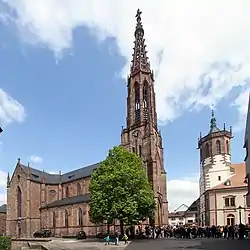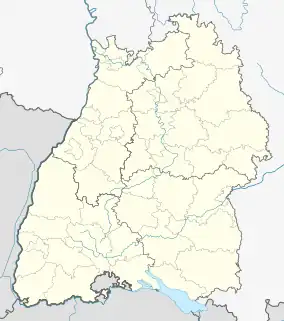Bühl | |
|---|---|
 Church of Saints Peter and Paul | |
.svg.png.webp) Coat of arms | |
Location of Bühl within Rastatt district  | |
 Bühl  Bühl | |
| Coordinates: 48°41′43″N 8°8′6″E / 48.69528°N 8.13500°E | |
| Country | Germany |
| State | Baden-Württemberg |
| Admin. region | Karlsruhe |
| District | Rastatt |
| Subdivisions | 11 |
| Government | |
| • Lord mayor (2019–27) | Hubert Schnurr[1] (FW) |
| Area | |
| • Total | 73.21 km2 (28.27 sq mi) |
| Elevation | 138 m (453 ft) |
| Population (2021-12-31)[2] | |
| • Total | 28,833 |
| • Density | 390/km2 (1,000/sq mi) |
| Time zone | UTC+01:00 (CET) |
| • Summer (DST) | UTC+02:00 (CEST) |
| Postal codes | 77801–77815 |
| Dialling codes | 07223 |
| Vehicle registration | RA, BH |
| Website | www.buehl.de |
The city of Bühl (Low Alemannic: Bihl) is part of the district of Rastatt in the southwestern state of Baden-Württemberg, Germany. It has a history reaching back to the twelfth century and was formerly an agricultural town, especially famous for its plums. Bühl has a population of about 29,000, and is in the region between the Rhine Valley and the Black Forest.
Today it is mainly an industrial town, especially in the car manufacturing supply industry. Yet it still has preserved its character and is also renowned for its good restaurants.
Bühl is a town in the southwestern state of Baden-Württemberg, Germany, about 10 km (6.2 mi) South of Baden-Baden. Bühl is the third largest town in Rastatt County (Landkreis), after Rastatt itself and Gaggenau. Due to its location, size and importance it has become a central place for numerous towns, townships and villages in the neighbourhood. Bühl was proclaimed a major district town (Große Kreisstadt) on 1 January 1973, after it lost its status as an independent county seat during municipal reforms in Baden-Württemberg. The following villages form the district town of Bühl: Altschweier, Balzhofen, Eisental, Kappelwindeck, Oberbruch, Oberweier, Moos, Neusatz, Rittersbach, Vimbuch, Weitenung. Bühl forms a joint administrative community with the municipality of Ottersweier.
History
Etymology
The word Bühl is derived from Old German "puhil" and Middle German "buhel", meaning "hill". The three yellow hills on blue ground seen on the coat of arms (already displayed in the court seal of Bühl in 1324) confirm this interpretation.
To distinguish Bühl from other towns named Bühl, not only in Germany, but other German-speaking countries like Switzerland and Austria, the town used the denominator Bühl (Baden) or Bühl/Baden, clearly identifying Bühl in the Margravate of Baden (Baden) and later in the Grand Duchy and the State of Baden. With the unification of Baden, Hohenzollern and Württemberg in 1952 forming the state of Baden-Württemberg and later the introduction of postal codes there was no need anymore for the denominator Baden. However, it is still used frequently.
Notable people

- Alban Stolz (1808–1883), professor of theology
- Ralf Dujmovits (born 1961), mountaineer who climbed all eight thousand-meter mountains
- Christian Lusch (born 1981), sport shooter
- Stefan Kneer (born 1985), handball player
- Herbert Bloch (1907-1987), stamp dealer and expertiser[3]
References
- ↑ Aktuelle Wahlergebnisse, Staatsanzeiger, accessed 14 September 2021.
- ↑ "Bevölkerung nach Nationalität und Geschlecht am 31. Dezember 2021" [Population by nationality and sex as of December 31, 2021] (CSV) (in German). Statistisches Landesamt Baden-Württemberg. June 2022.
- ↑ Hudson, Edward (10 September 1987). "Herbert Bloch, a Top Expert In World of Stamp Collecting". The New York Times. ISSN 0362-4331. Retrieved 2 February 2023.
External links
- Bühl city website
- Websters Archived 4 February 2005 at the Wayback Machine